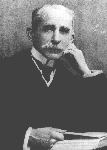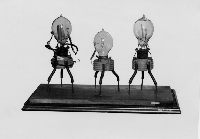John Ambrose Fleming
- the founder of electronics?
- his invention of his oscillation valve or vacuum tube enabled
wireless technology to move forward and the new science of electronics to begin.
Professor Sir John Ambrose Fleming is one of the great men of
radio and electronics. His invention of the thermionic valve or vacuum tube
could be said to be the beginning of modern electronics. It enabled wireless and
later electronics technology to move forward, enabling many, what would now be
termed vintage wireless sets to be manufactured. Although the invention of the
thermionic valve or vacuum tube is his major claim to fame, he also made many
important contributions to the field of electrical machinery.
Education
John Ambrose Fleming was born on 29th November 1849, the eldest of seven
children born to a Congregational minister. Although born in Lancaster his
family moved to North London where he spent most of his early life. He was
educated mainly at University College School on Gower Street in the West End of
London. From here he moved on to take his degree also at University College.
Although he had to take up a daytime job to finance himself he was still able to
gain a first class degree.
Having completed his course Fleming took up a teaching post,
but felt that he could further himself if he undertook more studies. Accordingly
he entered the Royal School of Mines to study Chemistry, but again finance was a
problem. To earn some money he took up a teaching post as a science master, and
during this time he came across some of Maxwell's work. This fascinated him and
he decided to further his career in this direction. So in 1877 Fleming started
to study electricity and magnetism at Cambridge. Here he was particularly
successful gaining his D.Sc. and then a year later he was elected a fellow by
his college.
At Cambridge
Fleming started to lay the foundations of a very successful career during his
time at Cambridge. He became a demonstrator, and this gave him the stepping
stone to enable him to take up the position of Professor of Physics and
Mathematics at the institution that has now become Nottingham University. His
time at Nottingham was relatively short, as he took up a position as a
consultant to the Edison Telephone Company. This enabled him to see many of
Edison's inventions, and he even travelled to the Edison's laboratories in the
USA. This was to be a crucial event although he did not know it at the time
because it was to shape the future. Here he saw a discovery known as the Edison
effect. It was found that an evacuated light bulb with a second electrode would
allow current to flow from one electrode to the other, but only in one
direction.

Ambrose Fleming
(Courtesy Marconi plc)
Fleming's long term aim was to be able to return to London.
At the time there were no positions in the new and developing science of
electrical engineering. Instead the nearest subject was physics. However Fleming
was invited to give a series of lectures on electrical engineering at University
College London (UCL), the premier college of London University. Then in 1885 he
was asked to set up a new department for electrical engineering for which he
would be professor. This was the beginning of a long association as he held the
chair at UCL for 41 years. It was also a notable first because it was the first
department of its sort in the country and it reflected the forward thinking of
this world leading university.
Fleming greatly enjoyed his time at UCL. He was able to spend
time lecturing, he was able to undertake his research and in addition to this he
was in London where he wanted to be. He devoted much of his time to work on a
variety of aspects of AC machines and he became a leading authority on
transformers as well as performing much valuable work on improving the accuracy
of AC measurements.
As a lecturer he was noted as being fascinating, but it was
very difficult to take notes during his lectures. He spoke very fast and did not
have any breaks in the lecture to enable people catch up. He also detested
smoking so it was rather amusing that his office was close to the entrance at
UCL where students would come in from outside "wreathed in smoke" and walk
straight past his office.
Oscillation Valve
In 1899 Fleming became a consultant to the Marconi Company in addition to his
duties at UCL. At this time wireless, as it was then known, was still in its
infancy and Marconi was continually making an improvement in the distance that
could be achieved. In 1901 he succeeded in sending a message across the
Atlantic. Fleming became quite absorbed in the subject. He even designed the
transmitter that made the first transatlantic transmission. He was also somewhat
eccentric and during his experiments with transmitters he would always use the
letter V sent in Morse (�-) as the test letter. In fact he became so involved in
this work that he would often be heard unconsciously humming the letter V or
whistling it between his teeth.
Fleming recognised that the major problem preventing vast
improvements being made was that of detecting the signals themselves. In these
early days the coherer was the main form of detector and it was very
insensitive. Fleming devoted his mind to this, and in his quest to make
improvements he tried a large number of new ideas many new ideas to bring the
required improvements. However he was pondering some improvements in October
1904 and had what he later described as a "sudden very happy thought." He
instructed G.B. Dyke his assistant to set up an experiment with one of his
evacuated bulbs with the additional element, to put his new idea to the test. It
worked it was just a month later on a chilly November morning (16th November
1904), that a former colleague saw him "scudding" down Gower Street in Central
London on his way to patent what he termed his "oscillation valve." He called it
a valve because it worked in the same way as a fluid valve, allowing a flow only
in one direction.

Fleming's first valves or vacuum tubes
(Courtesy Marconi plc)
Shortly after his discovery Fleming wrote to Marconi to tell
him of his discovery. In the letter he mentioned that he had not mentioned the
idea to anyone as he thought it might be very useful. Little did he know of its
importance, although it did not bring any money to the Marconi Company. Any
returns from the invention made were used in fighting the legal battles that
were to arise later.
Competition
The invention of the diode valve or vacuum tube was a revolutionary idea, and
put down the foundations for many further inventions. However it had very little
impact at first. "Valves" were expensive to make and on top of this other ideas
were overtaking him. In less than two years the cat's whisker was produced. This
was a very crude form of semiconductor rectifier that consisted of a thin wire
positioned on a lump of suitable material (even coal) to produce a point contact
rectifier. This was far more convenient than Fleming's diode and it soon caught
on.
Other people were looking into thermionic or valve
technology. Around 1906 the de Forest Company in the USA introduced a device
called an Audion. It used the same basic vacuum tube technology as Fleming's
diode, but a third electrode had been added. This was called a grid because of
the nature of its construction. Initially the Audion vacuum tube was only used
for detection of signals, it took another four years before it was used as an
amplifier.
There was considerable comment in the scientific community
regarding whether the Audion was an infringement of Fleming's original idea.
Fleming himself never claimed any credit for the introduction of the grid, but
did contest the patent infringement of the thermionic technology in the courts.
Unfortunately he lost, but many in the scientific community agreed with him.
Retirement
Fleming remained at University College until 1926, retiring to the quiet seaside
town of Sidmouth in Devon. Although he retained the position of his Marconi
consultancy almost to the day he died. Then in 1929, just over two years after
his retirement he was knighted for the many advances he had made to electrical
and electronic engineering.
During his retirement, Fleming still took an active interest
in many new developments in the electronics world. For fifteen years he was
president of the Television Society, often travelling to London for their
meetings.
He also had many interests outside his work. He had a keen
interest in photography and loved walking. He was also a devout Christian, and
he often preached at various churches and was once asked to preach at St
Martin's in the Fields in Central London. With his advancing age Fleming became
increasingly deaf, however he remained active until his death in 1945 at the
great age of 95. During his life he made achieved a tremendous amount, but it is
certain that he will be chiefly remembered for the invention of the thermionic
valve.
|

